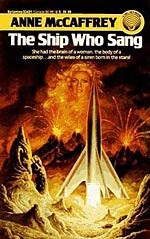
![]() Rhondak101
Rhondak101
1/12/2012
![]()
Anne McCaffrey’s The Ship Who Sang is a collection of six novelettes and novellas published between 1961 and 1969. Most of them stand alone but also work as well as the continuous story of Helva, the ship who sang. McCaffrey creates a world in which humans have colonized other planets and have discovered many types of life forms “out there.” In this world, however, humans are still born with birth defects. These babies are tested for high levels of brain functions. If they do not pass the tests, they are euthanasized. If they do pass the test, their parents are given the choice between euthanasia or placing them in a school to learn to be the “brains” of a spaceship. These spaceships work for Cencom, delivering important cargo, transporting dignitaries, and other humanitarian or emergency jobs. These babies are taken from their parents and entered into a school, where they are placed into smaller machine bodies and trained for their ultimate insertion into a ship. The children are given drugs to stunt their growth so that they may be permanently fitted into the control column of the ship. For Helva, the ship’s mobility is her mobility; its sensors are her senses. Her body is pumped nutrients, and she never sleeps. McCaffrey’s cyborg ship idea is fascinating, and she explores its potential in the first chapter. The readers learn more about Helva’s existence in the successive chapters.
The class of ship that Helva becomes is called a BB ship, signaling the two components, the brains, Helva and her ilk, and the brawns, the fully mobile human pilots who travel with the ships. The chapters explore Helva’s relationships with her brawns as she and they undertake the assignments given to them by Cencom. In my opinion, the first three chapters are the strongest narratives, both in their relation to one another and as independent stories.
Reading this collection more than forty years after the individual parts were written, I can see how McCaffrey is working with early feminist ideas. Helva is strong, opinionated, and smarter than all of the men she encounters. She is able to choose her brawns, who must court her (McCaffrey’s term). She becomes financially independent in the course of the book, fights for her rights, makes choices that will ensure her growth and well-being. However, the weakness is that McCaffrey can quite break out of is the idea that the brain-brawn relationship is a traditional concept of marriage. We see Helva fall in love with, break up with and enter into an “oil and water” relationship with various brawns. McCaffrey does not exactly force compulsory heterosexuality on Helva because she once has a female brawn (whom she often misses when the men seem incompatible to her).
I applaud McCaffrey for what she was trying to do, but from my future perspective The Ship Who Sang is dated in the way it handles (and focuses on) relationships. I would like to see Helva using her brains to solve problems related to her assignments rather than worrying about her relationships with past, present, and future brawns. However, Helva is a fantastic feminist character and offers strong evidence against the critics who say that science fiction authors can’t create characters with depth.